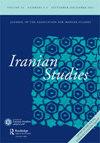卡尚和纳坦兹之间山村里的伊尔汗尼木雕
IF 0.9
4区 社会学
Q2 AREA STUDIES
引用次数: 0
摘要
本文调查了Firizhand、Quhrud、Abyana和Barzuk四个村庄清真寺的木雕。它们雕刻于700/1300-1年和705/ 1306 - 6年之间,由门、柱和柱头等建筑元素组成。最近在拆毁的巴尔祖克贾米清真寺发现的木制品证据表明,这座建筑及其装饰是由一位多才多艺的艺术家完成的,他很可能是阿布·扎伊德的后裔。此外,在库鲁德清真寺新发现的石柱表明,与之前认为的相反,目前的建筑与其年代久远的门不是同时代的,而是在几个世纪后建造的。有趣的是,这些木制清真寺是在合赞汗统治的最后几年建造的,见证了他在全国所有村庄建造清真寺的命令。这些木制品为我们了解14世纪早期的艺术和文化状况提供了重要的线索。本文章由计算机程序翻译,如有差异,请以英文原文为准。
Ilkhanid Wood Carvings in the Mountain Villages between Kashan and Natanz
Abstract This paper surveys some wood carvings belonging to four mosques in the villages of Firizhand, Quhrud, Abyana, and Barzuk. Carved between the years 700/1300-1 and 705/1305–6, they consist of architectural elements such as doors, columns, and capitals. The recently found woodwork evidence from the demolished Jamiʿ mosque of Barzuk reveals that this building and its decorations were executed by a multiskilled artist, who was most likely a descendant of Abu Zayd. Moreover, the newly discovered columns from the Masjid-i ʿAli in Quhrud show that, in contrast to what was previously thought, the current building is not contemporary with its dated door and was erected in later centuries. Interestingly, these wooden mosques were built during the last years of Ghazan Khan's rule and witness his order to construct mosques in all the villages of the country. This woodwork offers significant insight into the artistic and cultural situation of the early fourteenth century.
求助全文
通过发布文献求助,成功后即可免费获取论文全文。
去求助
来源期刊

Iranian Studies
Multiple-
自引率
0.00%
发文量
92
期刊介绍:
Iranian Studies is a peer-reviewed journal devoted to Iranian and Persian history, literature, and society, published on behalf of the Association for Iranian Studies . Its scope includes all areas of the world with a Persian or Iranian legacy, especially Iran, Afghanistan, Central Asia and the Caucasus, and northern India, and Iranians in the diaspora. It welcomes submissions in all disciplines.
 求助内容:
求助内容: 应助结果提醒方式:
应助结果提醒方式:


